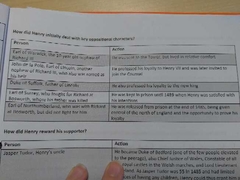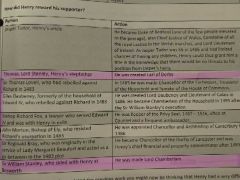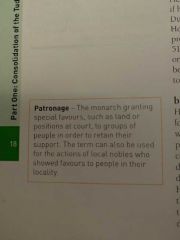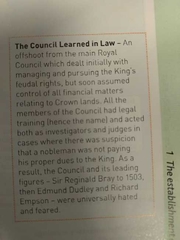![]()
![]()
![]()
Use LEFT and RIGHT arrow keys to navigate between flashcards;
Use UP and DOWN arrow keys to flip the card;
H to show hint;
A reads text to speech;
38 Cards in this Set
- Front
- Back
|
Henry VIIs Character |
Could be ruthless and severe but not blood thirsty or egotistical Appears shadowy and remote compared to other monarchs Refugee Hunger for power Paranoid, manipulative, somber Religious, wise, brave, shrewd, prudent Astute, clear thinking, not sentimental Respected but not popular |
|
|
Henry VIIs claim to throne |
Mother - third son of Edward III was her great grandfather ( but John of Gaunt and Catherine Swynford were not married when they conceived her grandfather)
Father - Grandmorher, Catherine, had been married to Henry V before she married his grandfather |
|
|
Henry VII context |
-Born 1457, son of Edmund Tudor, earl of Richmond who died months after his birth -Grew up with mother and uncle Jasper Tudor -After various deaths in Wars of the Roses, expectantly became main Lancastrian claimant -Live 14 Years in Exile in Brittany as a result |
|
|
Arable Farming |
Large fields were divided into strips by landowners and given to tenants |
|
|
Common land |
Available to all common villagers and everyone had rights to graze on it |
|
|
Enclosure |
Late 15th century Land lords fenced off land for one crop or livestock Arable -> pasture farming As sheep farming was more profitable Fierce opposition from villagers claiming customary rights |
|
|
Cloth Industry |
Nearly 80% of exports Agriculture = main livelihood Woollen cloth industry = most wealth Quality of wool in high demand home and abroad |
|
|
English society |
Great chain of being Primogentry Appointed on 3 earls in time - very special, honourable title, ensuring loyalty and support Divine right of kings |
|
|
Catholic church |
Owned 1/3 of land 35,000 ordained clergy 10,000 nuns and monks |
|
|
Richard III |
EdwRd IV dies 1483 2 young sons left Richard puts them in the tower of London Accused of killing two young nephews
His rule let to more disunity Ruthless methods provoked more opposition |
|
|
Battle to Bosworth 1485 August |
-Henry came from exile in Brittany to help out Buckinghams rebellion -Landed in Wales with small army -Support of Rhys ap Thomas ( one of the most powerful land owners in Wales) promising to make him Lieutenant of Wales. -Gained soldiers as he walked -Him and Earl of Richmond have 5000 strong army -Richard outnumbered them and had better position -Lord Stanley and brother Sir William position north to battle site with 4000 men. -Richard had taken Thomas Stanley's son hostage, reluctant to support -Afraid to help Henry if he lost -Earl of Northumberland also waited until a clear outcome... -Richard was winning with superior forces so Henry asked Stanley's to join him -William Stanley ordered his cavalry to attack Richard -Richard was cut down, last English king to die in battle
|
|
|
Other claimants |
Edward IVs sister married John de la pole, two sons had good claim as henry, john and Edmund |
|
|
Henry's accession advantages |
No king makers Weak nobles from war of roses, mutual destruction between outliers and lancastrians, dead meant land given to throne Losing side had punishment and inheritance due to traitorous Adult, recently proven in battle and successful leader. Few personal enemy's is from obscure Welsh heritage and years in exile |
|
|
Henry's establishment of throne |
Official lavish coronation, approval of church and oath of loyalty from nobles Married Elizabeth of York 1486 Secured Earl of Warwick Appointed elderly Yorkist experienced churchmen at kings counsel Embarked on Royal progress
|
|
|
Dealing with opposition from battle of Bosworth |

Shrewd enough to realise showing leniency would win at least gratitude and possibly loyalty |
|
|
Rewarding his supporters from battle of Bosworth |

Tactical and political awareness in handling nobility shown Showed willingness to reward to maintain support and loyalty |
|
|
Problems for Henry's control in 1485 |
-Nobles wealth and territorial power made them rivals to the crown - uneven control over kingdom strong over populated weak in borderlands - poor finances for crown, depleted by wars at home and abroad
Henry was determined to manage government by himself. Natural suspicions and anxieties caused Henry to act firmly and occasionally harshly - giving him a poor reputation
Visitor from Florence "more feared than loved" |
|
|
How Henry controlled the nobles |
Attainders, Patronage, Attacks on retaining, financial controls |
|
|
Attainders |
Attainders- seize the titles and possessions from nobles he suspected disloyal He asked the first parliament to issue an attainders against the men who opposed him in the battle of Bosworth Past 136 attainders, reversed 46 Sir Thomas Tyrell had to pay £1,738 for reversal of his and his fathers attainder |
|
|
Patronage |

Henry largely abandoned Edward IVs policy of distributing lands to loyal followers Vacant lands were absorbed by Henry, making him by far the biggest land owner When he need royal agents for local communities he looked go men down the social scale who did not have extensive lands They were therefore dependant on him for the position and status they held and were not distracted by comforting loyalties |
|
|
Attacks on retaining |
Practice of noble men keeping large numbers of men as personal staff, in theory to use as household servants but in practice as gangs of enforcers, Put pressure on tenants who were slow paying rent or on juries to return the verdict their masters wanted Laws making it illegal 1485 - parliament, lords and commons swear not 1504-nobles need special
Penalty of £5 a month per illegal retainer |
|
|
Financial Control |
Demanding a financial bond from individuals of noble families Places family in debt go crown so they'd remain loyal in future Forced nobles to behave themselves or face a ruinous fine In the last decade of Henrys reign 2/3 of the nobility were held under bonds
Lord Burgavenny convicted 1507 of illegally retaining 471 men and fined £70,000. This would bankrupt him so under agreed to place him under bond to repay £5,000 over ten years
Established Council of Learned in Law to enforce these rights |
|
|
Justice of Peace (JPs) |
Appointed from annually from the local landowners Responsible for public order, making sure laws were implemented and dispensing justice to criminals |
|
|
Local and regional government |
Parts of the country were notoriously difficult to control except by relying on the present of local nobility In more settled regions earlier kings had built up number and pose of JPs
Since total control over the kingdom was so uneven Henry did not attempt to make one system of local government but relied on the most appropriate solution for each region |
|
|
Opinion on Henry's usurp |
He became king under better circumstances than any other usurper in late medieval England. Like Henry he had the advantage of replacing a widely disliked king and that he was dead, no powerful kingmaker to contend with, the bible house which gained most was the Stanley's, who's Henry's mother Margaret Beaufort had married and it was unlikely that the head of the house Lord Stanley would lead a rebellion against his own stepson |
|
|
Richard Duke of York |
Younger son of Edward IV, stronger yorkist claim to throne. Imprisoned and killed in tower by Richard III |
|
|
The Council of Learned in Law |

|
|
|
The Star Chamber |
Created by Starchamber Act 1487 Responsible for prosecuting anyone who behaved in a rebellious or lawless manner. Members of the Royal council - the kings most favoured advisers - sat on the court to make these judgments. Therefore it was possible to haul even the greatest noble man before it. It also came to be used as a court of appeal Questions amount of use during Henry's reign but much more development in its organisation and use under Wolsey |
|
|
Edward V |
Elder son of Edward IV, stronger yorkist claim to throne than Henry. Imprisoned and killed in Tower by Richard III
|
|
|
Edward, Earl of Warwick |
Son of Edward IV brother, niece, potential claimant to throne. Kept in tower? In relative comfort
|
|
|
Margaret of Burgundy |
Sister of Edward IV, Yorkist, hated Henry, got armies and pretenders against him. Died of old age, husband made her stop fighting when they became allied
|
|
|
Francis, Viscount Lovell |
Friend and Chamberlain of Richard II, led a small uprising against Henry 1486, questioned Henry's right to rule. Escaped to Flanders under Margaret Bs protection |
|
|
John re la Pole |
Son of Richard IIIs sister, niece, and nominated by Richard as his heir Helped in Lambert Simnel rebellion Killed in rebelling 1487 at Stoke
Edmund De la Pole Younger brother, 1499 fled to netherlands with maximilians support 1506 imprisoned in Tower of London and died |
|
|
Humphrey Stafford |
Yorkist, planned Lovell Uprising Executed for treason |
|
|
Earl of kildare |
Lord deputy of Ireland Supported pretenders, Lambert simnel |
|
|
National Government under Henry |
-personal government by king and advisers at court -parliament existed but played a minor role in politics, mostly to pass laws and vote for his additional taxes Met infrequently and used sparingly by Henry, usually during his first decade to support controversial policies like limitations on traditional privileges of nobles. - assumed all power derived from monarch, parliament served in interest of king and keep subjects under control
|
|
|
How did Henry improve administration of his finances |
At the start of his reign he allowed the departments of state such as the treasury and the Exchequer to take control but they were clumsy and inefficient so he quickly followed Edward IVs example dealing with administration of finances from his private room at the palace - the Chamber and Privy Chamber Established a new post of Surveyor of the kings Ward to investigate cases online owed to him from wardships And a Court of Audit to monitor government spending Henry's financial policies were cautious and realistic, avoided conducting an aggressive foreign policy, exploited his legal rights to claim special payments from his nobles both to swell his treasury and remind them of his control over them But he was also prepared to overlook or reverse his claims when it was necessary to win support Some present Henry as a miser, obsessed with hoarding money, Some truth in final decade But he always spent money extravagantly when it was necessary to enhance image of kingship Only after death of wife and son did he become obsessed with hoarding money, fearing his succession was not yet secure ? His income was nearly 20 x the wealthiest noble |
|
|
Crown lands |
Henry inherited all the lands held by the houses of York and Lancaster, the Earlooms of Richmond and Warick, the duchy of Lancaster and the Principilality of Wales. Further increased by Attainders Organisation/ administration: Edward IV improved administration of crown ands by introducing techniques of estate management. Henry was less inclined to grant lands to friends and family than him. He preferred to hold on to them to maximise both his influence and his income from leases and rents Improvement/ developments under Henry VII: In 1486 Henry used the Act of Resumption to reclaim a crown lands that had been granted since the start of the wars of the roses but he did not always act on these claims. The potential threat to a noble family could be more useful to Viber them than acc pressing the demand for return of the land to the king |

